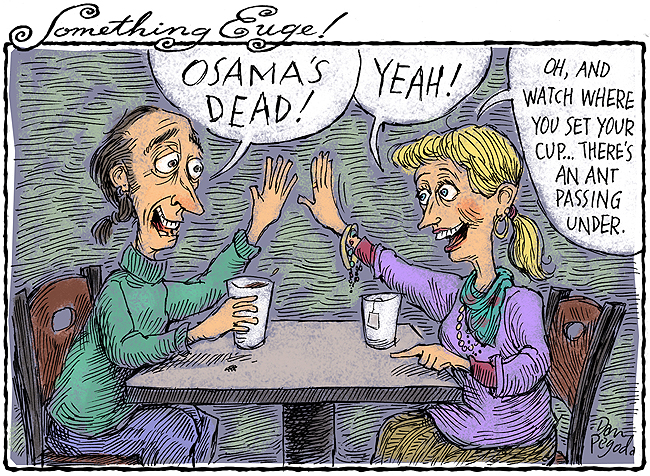
News Briefs: Gun Violence Linked to Cuts in Social Services | Kids and Radiators | Running on Idle | UO Gets Bike Silver Award | Cienfuegos in Town | Tamim Ansary Speaks at LCC | Bike Politics | Raffle Bike Stolen | Bill Keeps Kids Out of Adult Jail | Endorsements at a Glance | Activist Alert | War Dead | Lighten Up |
Slant: Short opinion pieces and rumor-chasing notes
News:
Spending Against Schools
Rich conservatives break records to fight tax for kids
Happening People: Dale Berg
GUN VIOLENCE LINKED TO CUTS IN SOCIAL SERVICES
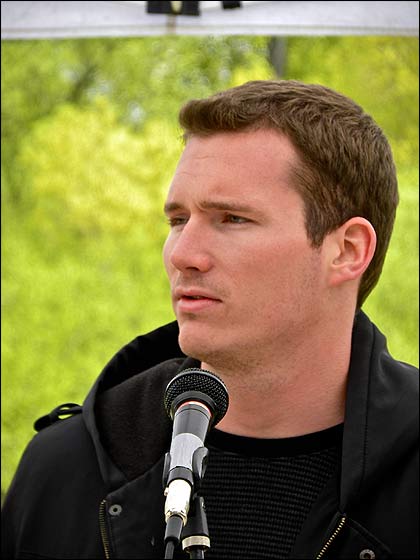 |
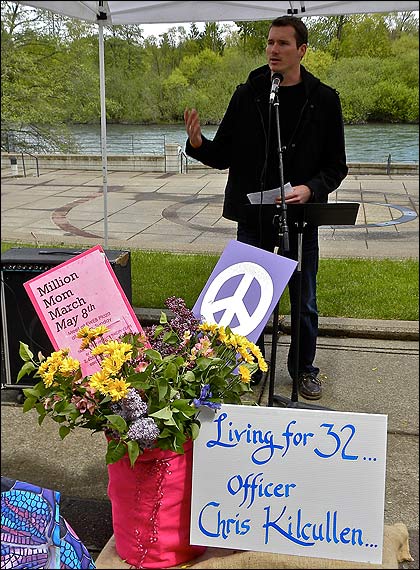 |
| Colin Goddard. Photo by Ted Taylor |
Virginia Tech shooting survivor Colin Goddard was in Eugene for the Million Mom March Against Gun Violence May 8 and said social services such as mental health counseling are “crucial to helping reduce gun violence and need to be as well funded as they can be.”
Goddard, who survived four bullet wounds, is on a national tour as a spokesman for the Brady Campaign to Prevent Gun Violence. He spoke with EW during the march from EWEB Plaza to Owens Rose Garden. The march this year was in honor of slain Eugene police officer Chris Kilcullen
Gun violence and mental health services “are absolutely related, even if you look at the death of officer Chris Kicullen by someone who was (allegedly) dangerously mentally ill with a firearm,” said Goddard. “Guns dont kill people, people kill people, and if thats true we need to do a better job of checking those people. Mental health services is something that prevents shootings from ever coming about. It helps deal with people before they decide to lash out and violently harm others.”
Goddard said the state of Virginia spends less now on mental health services than it did when the school massacre happened in 2007. “Unfortunately, state legislatures are feeling the pinch and mental health services is usually where they go for cuts,” he said. “That puts everyone at a higher level of danger.”
In his public talk before the march, Goddard said the news about the death by gunshots of Osama bin Laden has gotten worldwide attention, but “more Americans have been killed by gun violence here at home over the past 30 years than have been killed in all the wars weve fought overseas in the past 30 years. We march for those killed abroad, and those killed at home; the thousands who are killed every year, for the average of 32 who are killed every day in America, for the 32 who were killed at my school four years ago, for officer Kilcullen, one of the 32.”
Goddard called for better background checks, “limiting the firepower that was created for military use that is being sold to the public,” and banning 30-round magazines.
He concluded saying “I think people are gathered here to day because were fed up. We want things to change. And I dont want people to go through what I went through. Weve changed nothing since our countrys last major shooting. We should not be surprised when the next one happens.”
While in Eugene, Goddard also showed his documentary Living for 32 in which he demonstrated how easy it is to take cash into gun shows and buy handguns without ID or background checks. ã Ted Taylor
KIDS AND RADIATORS
Hillary Johnson, chair of Strong Schools Eugene, spoke at the Million Mom March gathering in Eugene May 8 and said the campaign to pass Measure 20-182 is “about kids and radiators.”
Johnson said she got involved in the temporary income tax for schools issue after visiting the school where her daughter will be going next year and seeing class sizes so big kids had to sit on radiators.
“Then, when I heard kids complaining about not enough school, I knew our schools needed help,” she said, drawing laughs from the crowd. “All across America public schools are suffering from budget cuts that are gutting programs, laying off teachers and shortening the school year. But here in Eugene we have the opportunity to do something about it.”
Johnson said if this measure doesnt pass, “were talking about kindergarten classes of 30-plus 5-year-olds and one teacher. Moms out there: remember your 5-year-olds? Imagine having 30 of them, one adult, and now lets learn how to read.” She said middle school math classes are expected to grow to 53 kids.
“We cannot starve out schools while we wait for the state to clean up this funding mess,” she said. “We must step up for our schools, our kids and our community.” ã Ted Taylor
RUNNING ON IDLE
A bill restricting idling, long in the works in the Oregon Legislature, may be passed as a shadow of its original self. It would also limit what local municipalities could do to protect and control their air.
House Bill 2081, which aims to reduce the amount of time that vehicles can idle, has been “gutted and stuffed,” according to Oregon Toxics Alliance (OTA) Director Lisa Arkin, and it could wind up doing more environmental harm than good. The current version of the bill contains a preemption clause that reserves idling regulations for the state, superceding local statutes and plans. “Its not democratic,” Arkin says, “because it takes away the ability of people to determine their own standard of living.”
Lane County commissioners and the city of Eugene oppose the bill with the preemption clause. “The city has a dynamite energy action plan,” Arkin says, but the preemption clause in HB 2081 would prevent the city from fully controlling its own environmental policies. Eugene businesses and organizations have expressed support for idling reduction. Rexius Forest Byproducts, Lane County, the city of Eugene, Sequential Biofuels and Market of Choice are among the groups that have adopted no idling policies. UO has a voluntary no idle policy.
The bill started out with stronger measures resulting from when the 2009 Oregon Legislature passed HB 2186, which ordered the Department of Environmental Quality to determine how to reduce greenhouse gas emissions from commercial trucking. The DEQ formed an advisory committee of citizens and stakeholders, including the Oregon Trucking Association, to develop recommendations.
The DEQs original recommendations would have required truckers to gradually phase in technology that would allow their trucks to function ã running heating and cooling systems or other electric-dependent processes ã without running their engines. Under these regulations, thealternative technologies would pay for themselves with saved fuel expenses, and truckers and their cargo would still be able to rest in comfortable conditions.
During the comment input period, Arkin says the committee added exceptions that negate much of the HB 2081s intended impact. The bill allows idling for an indefinite period of time when temperatures are below 50 degrees and above 75. Arkin says that other, colder areas have tougher limits. A local ordinance in Dane County, Wisc., for example, allows 15 minutes of idling at temperatures below 40 degrees or above 80 degrees.
In addition to the emission of greenhouse gases, OTA and other groups are concerned about the effects of diesel particulate matter from unnecessarily idling diesel engines. Children and elderly people are particularly sensitive to the respiratory effects of the particulate, which is one reason Arkin advocates for local control.
Arkin says, “Once this bill passes, with its incredibly weak language, there is no opportunity for DEQ to fix parts of the bill that dont work very well or get public input.” ã Shannon Finnell
UO GETS BIKE SILVER AWARD
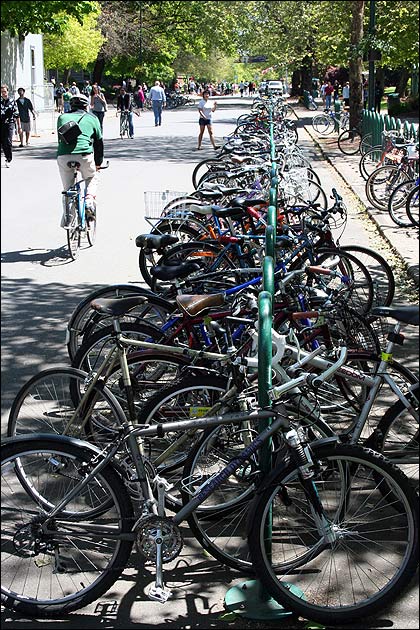 |
The UO won a national silver award last week for student efforts to promote biking, but its unclear if the commitment from the UO administration is there to go for the gold.
League of American Bicyclists President Andy Clarke made the trip from Washington, D.C., to hand UO President Richard Lariviere a sign for the 2011-2015 Bike Silver designation and congratulate the university for its 17 percent bike commute rate.
But Clark recommended that the UO join other top biking universities by adding professional bike coordinator staff to plan for and promote cycling on campus. “You could be probably twice that [17 percent] number if you put your minds to it.”
Lariviere touted the UOs bike credentials but acknowledged, “We have a long way to go. We have to plan better, we have to integrate overall transportation thinking into our planning better, and we need professional individuals to come to the rescue of our students who have been working so valiantly. We will do these things, and when we do, we expect you back, Andy, with a gold or a platinum award.”
But interviewed after his speech, Lariviere balked at clarifying whether he was making any sort of commitment to actually adding any professional staff to support biking. Asked to clarify if what he said meant that the UO would add part-time professional support, a full-time position or was just considering whether to add professional support for biking, Lariviere answered only “yup.” The UO president then laughed and turned away.
“The university needs more than just a student-lead program,” Clarke said. “It needs to be a real priority for the university.”
Clarke said universities like Michigan State, Stanford, the University of Arizona and Arizona State all have full-time, professional bike coordinators. The coordinators plan bike infrastructure, promote bicycling and educate students on safe riding, he said.
The student government funded UO Bike Program has a student working part time as a coordinator, Ted Sweeney. Sweeney, who plans to graduate next fall, said he agrees with Clarke that the UO administration needs to commit to adding dedicated professional staff to support the effort. “I think its a great idea.”
In accepting the award, Lariviere noted the importance of biking to the UO. “Bicycling is cost effective, healthy and contributes to campus sustainability,” he said, noting that it fits with campus climate change reduction and health promotion plans. By reducing the cost of transportation, cycling is “effectively making the very education here less expensive,” Lariviere said.
Lariviere thanked students in the campus Live Move group for completing and submitting the application for the award. Lariviere said “accommodating bicycling” is “something we have been proud to do well for a long time.” He said the UO was a leader in closing 13th Avenue through campus to cars, in creating a campus bike plan in 1991, in offering a class in bike planning and in research on bike transportation.
“We are trying to keep construction of automobile parking to a minimum by making bicycling attractive and convenient,” said Lariviere. He said the new basketball arena “has more permanent bicycle parking than any arena of its size in the entire nation, and, more importantly, it gets used.”
On campus, “every time we expand our bicycle parking capacity, its full in short order,” Lariviere said. He said the student government association (ASUO) has funded the addition of way finding signs and shared lane markings on campus for this year. “Survey after survey shows the growing number of users. Over 4,000 students rely on bicycles as their main mode of transportation to the campus.”
Lariviere noted the citys success in promoting cycling. “Eugene sets the bar high, but we need to set it higher.”
ã Alan Pittman
(A version of this story first appeared at EugeneCycles.com)
CIENFUEGOS IN TOWN
“Its all about majorities of local people coming together and saying we have had enough,” said Portland-based activist Paul Cienfuegos. “Its about moving from •no to •yes.”
Dont expect a conspiracy theorist or ranting geezer when Cienfuegos speaks May 16 at Harris Hall in downtown Eugene. As a longtime advocate of social justice and founder of Justice Unlimited of Humboldt County, Cienfuegos has worked hard to make the American dream come true for everyone. “We have immense power as citizens under the law and the Constitution,” he told EW. “But this beast of corporate personhood is affecting so many issues.”
Cienfuegos attempts to raise awareness about how citizens can lessen the corporate grip on local politics. His activist track record is long, ranging from leading nonviolent direct action trainings to protest nuclear submarines to founding Justice Unlimited and a social change oriented bookstore, 100 Fires, and he is now writing his own book, a lay persons guide to ending corporate rule in the U.S.
Paul Cienfuegos speaks at 7 pm Monday, May 16, in Harris Hall, 125 E. 8th St.; suggested donation of $5 for students and kids under 16, $10 for adults; no one will be turned away for lack of money. For more on Cienfuegos go to his bookstore 100fires.com or www.paulcienfuegos.com ã Brit McGinnis
TAMIM ANSARYSPEAKS AT LCC
Nationally recognized author and lecturer Tamim Ansary will speak 7:30 pm Thursday, May 12, in building 19 at the LCC main campus. Born in Afghanistan, Ansary moved to the U.S. when he was 16 where he finished high school and college. In the days following 9/11, an email Ansary wrote to a few friends in response to calls to bomb “Afghanistan back to the Stone Age.” The email denounced the Taliban and Osama bin Laden and went viral, garnering him national attention.
In his memoir, East of Kabul, West of New York, Ansary describes his life growing up bi-culturally, straddling two lives. “This is an experience that not many people can relate to, but we all live in a fragmented world and experience transitions, so I think people can relate in that way,” Ansary said in an interview with EW.
Lanes Reading Together project, a program established eight years ago that engages students and faculty in reading and discussing shared texts, chose Ansarys memoir as one of their readings this year. “We try to chose a selection broad enough that different disciplines can use it,” explained Reading Together coordinator Eileen Thompson.
Ansary explained that a common picture people have of Afghanistan is the stereotypical images. “Part of what I get across is that its not like that. When you are there, its just normal. The normalcy of that otherness is something I want people to understand,” Ansary said.
The event is free and open to the public. For a full listing of Ansarys books and work visit: www.mirtamimansary.com
ã Heather Cyrus
BIKE POLITICS
“Bicycling, once largely seen as a simple pleasure from childhood, has become a political act,” wrote Jeff Mapes in his 2009 book Pedaling Revolution: How Cyclists are Changing American Cities (Oregon State University Press). The veteran Oregonian political reporter understands that one of the most important social movements of our time is essentially a political story. Mapes will be talking about the political power of the bike movement at 6:30 pm Thursday, May 19, at Cozmic Pizza, 8th & Charnelton. His talk is preceded by a 5:30social hour and presentation of the results of a bike rack design competition.
No revolution occurs without some gaining power and others losing it, and that means politics. The disastrous reign of the 20th centurys car-centric, sprawl-inducing, oil (and therefore military)-dependent, climate deforming transportation model is being challenged by advocates for cleaner, healthier, and above all cheaper human powered transport that can replace the large percentage of short trips for which most Americans currently use cars. That political battle is being fought in city halls, state and national capitols, and ã literally ã on streets across America, including New York and Portland.
Every cyclist knows that its easier to see more and to stay upright and balanced if you’re moving, and in his book and journeys made since then, Mapes ventured far beyondhis hometownPortland bikevana bubble to Boston, Chicago, New York, San Francisco, Seattle and other cities at the vanguard of the emerging revolution, finding progress in even the unlikeliest places, such as L.A.
Mapes is a bike commuter himself and his book is packed with salient facts gleaned from dozens of studies, books and interviews with a wide range of sources that refute the perceptions that more bikes means less safety, or that cyclists dont pay their fair share of road costs ã perceptions purveyed by grandstanding politicians and right wing talk show hosts. His years of covering Salem politics helps Mapes give readers a solid grasp of the bike revolutions political currents, in government and in the often-fragmented bicycle advocacy movement.
ã Brett Campbell
RAFFLE BIKE STOLEN
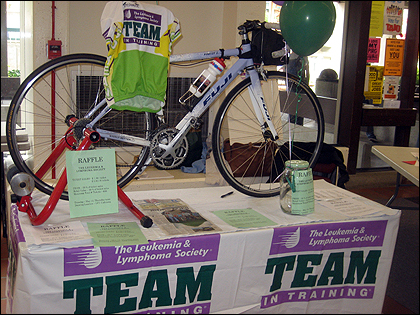 |
A Fuji sport road bike being raffled locally to support the Leukemia and Lymphoma Society (LLS) was stolen downtown the evening of May 5. Edana Paz of Springfield says the lavender and white Fuji Finest 2.0 bike, worth about $1,000, was secured by a cable lock to her cars Yakima rack, but taken from a parking lot at 15th and Willamette during the annual Cinco de Mayo celebration. The serial number on the bike is 1CF8A11686 and the theft has been reported to EPD.
Paz cycled with LLSs Team In Training to raise funds for the medical nonprofit in 2009, but says her efforts were interrupted with the diagnosis of lung cancer and subsequent surgery to remove the upper left lobe of her lung.She recuperated enough to complete a cross country bike ride in 2010 from Prineville to Bar Harbor, Maine, in 48 days. The bike being raffled off is the one she road, and still has the 19-function Trek computer, Dinotte 400L strobe light, white seat, Shimano pedals and a black Topeak wedge seat bag with spare tube and tools.
“My hope is that we will locate the bicycle, no questions asked, in order that I can complete my training and my fundraising commitment to the Leukemia and Lymphoma Society,” she says. “As a senior and a survivor of cancer who has lived in the community for over 40 years, I feel disappointment and sadness in realizing that such brazen theft occurs in downtown Eugene.”
She says her goal is to raise $2,300 by June 5. To view her website, visit http://wkly.ws/12b ã Ted Taylor
BILL KEEPS KIDS OUT OF ADULT JAIL
The Oregon Senate passed a House bill May 9 that will keep juveniles out of adult jail while awaiting trial. HB 2707 now goes to the governor for his signature.
“Under current practice most youth who are arrested on adult charges are held in adult jails ã places ill equipped to keep youth safe or provide the education and interventions that can help youth in trouble turn their lives around,” according to a press release from the Partnership for Safety and Justice that requested the legislation (see www.safetyandjustice.org).
This is “an important piece of legislation,” says Paul Solomon, executive director of Sponsors, Inc., in Eugene, and chairman of the PSJ Board of Directors. PSJ is a statewide nonprofit that works for “smart public safety policy, bringing together people convicted of crime, survivors of crime, and the families of both,” says Solomon.
ENDORSEMENTS AT A GLANCE
Below are our endorsements for Eugene ballot measures and selected contested races. Find explanations for our endorsements in our May 5 issue. See also the Voters Pamphlet. Ballots can be mailed in by May 12 or dropped off at white ballot boxes around town until 8 pm May 17.
LCC Director,Position 6 at-large ã Rosie Pryor
LCC Director,Position 7 at-large ã Tony McCown
Eugene 4J School Board,Position 1 ã Alicia Hays
Eugene 4J School Board,Position 4 ã Craig A. Smith
Eugene 4J School Board,Position 7 ã Mary Walston
Bethel School Board,Position 4 ã Todd Lipkin
Ballot Measure 20-182 ãTemporary income tax for schools ã YES
Ballot Measure 20-183 ã4J bonds for school facilities ã YES
ACTIVIST ALERT
« An indoor picnic and fundraiser for First Place Family Center, supporting homeless families with children, will be from 5:30 to 8 pm Thursday, May 12, at St. Mary Catholic Church, 1062 Charnelton.
« An all-ages free concert and rally for Strong Schools Eugene will be from 7 to 11 pm Friday, May 13, at Unity of the Valley, 3912 Dillard Road. Mayor Kitty Piercy will speak and undecided Eugene residents are urged to drop in to learn more about the initiative. Music by The Longshots, Against the Green, Barefoot Leroy, SEHS Jazz Band and the Eugene Peace Choir. Contact LeaJones99@gmail.com
« NowaCumig, Dennis Banks, elder of the Anishinabe Nation, co-founder of the American Indian Movement (AIM), will speak on the “National Indian Health Epidemic,” 7 pm Friday, May 13, in the EMU Ballroom at the UO about The Longest Walk 3, an over 5,000 mile walk to raise diabetes awareness, and on the prevalence of diabetes in Native American communities. Banks will also talk about the early days of AIM and his latest documentary A Good Day to Die.
« Sustainability activist Jan Spencer will give a free talk at 7 pm Wednesday, May 18, at Temple Beth Israel, 1175 E. 29th Ave. Call Spencer at 686-6761 or see www.suburbanpermaculture.org
« Congressman Peter DeFazio will speak at 7 pm Thursday, May 19, at Temple Beth Isral, 1175 E. 29th Ave. His talk, sponsored by J Street Eugene, will be on “The View from the House in 2011: Reflections on the Changing Landscapes of National and Global Politics.”
« The Eugene Coalition for Better School Food presents “Do You Know What Your Kids Ate Today? Nutritions Impact on Health and Learning” from 6:30 to 8:30 pm Thursday, May 19, at the Jefferson Arts and Technology Academy cafeteria, 1650 W, 22nd Ave. This presentation and community discussion will explore nutrition during a childs life from conception to adulthood and issues related to health, education, economics and politics.
WAR DEAD
In Afghanistan
« 1,562 U.S. troops killed* (1,560)
« 11,191 U.S. troops wounded in action (11,110)
« 763 U.S. contractors killed (763)
« $402.6 billion cost of war ($400.6 billion)
« $114.5 million cost to Eugene taxpayers ($113.9 million)
In Iraq
« 4,421 U.S. troops killed (4,421)
« 31,931 U.S. troops wounded in action (31,931)
« 185 U.S. military suicides (updates NA)
« 1,537 U.S. contractors killed (1,537)
« 110,005 to 1.2 million civilians killed* (109,895)
« $789.2 billion cost of war $788 billion)
« $224.4 million cost to Eugene taxpayers ($224.2 million)
Through May 9, 2011; sources: icasualties.org; defense.gov, U.S. Dept. of Labor
* highest estimate; source: iraqbodycount.org; based on confirmed media reports; other groups calculate Iraqi civilian deaths as high as 655,000 (Lancet survey, 2006) to 1.2 million (Opinion Research Business survey, 2008)
LIGHTEN UP
In the land of the blind, the one-eyed man is king. But in the land of the Tea Party, the king is the blind man and the one-eyed man is a Marxist evildoer. ã Rafael Aldave, Eugene
|
SLANT « If you missed our election endorsements last week, look for our Endorsements at a Glance this week. It only takes a few minutes to fill out the ballot and white ballot boxes can be found around town and on campus. Deadline for voting is 8 pm Tuesday, May 17. « The biggest item on the ballot is the temporary income tax for schools, and the R-G complicated the issue May 1 by editorializing against the measure and its “leakage” of revenue, saying that “a bucket that leaks 30 percent of its water has bigger holes than most.” As EWs Alan Pittman pointed out in his news story last week, “thats half the leakage rate of the property taxes that conservatives have repeatedly backed for jails, potholes and other measures.” Every tax has collection costs and there are always people and corporations that dodge taxes through exemptions, loopholes or downright deceit. It is peculiar that the R-G is against the tax, but endorses all the board candidates who are in favor of the tax. Is that some odd attempt at “balance”? « 4J School Board candidate and Eagle Scout Mark Callahan is running TV ads saying the quality of Eugene public schools has “degraded” and he knows how to fix it with an infusion of “leadership, character, courage and heart.” Alas, his plan does not support teachers and kids in any meaningful way. Its irritating to hear anyone, let alone someone running for the School Board, bashing the quality of our schools. Despite our current budget problems Eugene teachers and administrators are among the very brightest and best in the country. They need support, not derision. « We cant help but wonder: Is this debate over Measure 20-182 about taxes or is it about public education? The battle over public schools has been going on since our Founding Fathers. Thomas Jefferson prevailed in his efforts to establish free public education by arguing that our new nation can only be a viable democracy if we have literate and informed citizens. The argument against public schools, carried over from Europe, was that educated commoners were a threat to the aristocracy and to the power of the church. That thinking is still with us, most noticeably in the Tea Party. We still have an aristocracy and we still have religious conservatives offended by secular education. Lets show Eugene and every other city watching this election that we put public schools and democracy as our highest priorities. « NPR aired a “Planet Money” program last week relating to the claims that higher taxes cause wealthy people to move to other states and take their businesses with them. This was a predominant argument against the passage of Measures 66 & 67 last year, and carries over to the current debate over the income tax and bond measures for Eugene schools. The University of Massachusetts conducted a two-decade study and concluded that rising taxes have “essentially no impact on causing people to leave a state.” Hear the story or read the transcript at http://wkly.ws/12a SLANT includes short opinion pieces, observations and rumor-chasing notes compiled by the EW staff. Heard any good rumors lately? Contact Ted Taylor at 484-0519, editor at eugeneweekly dot com |

DALE BERG
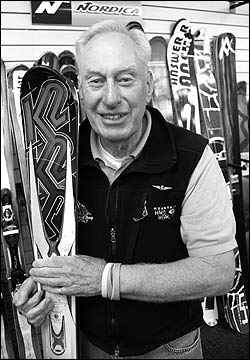 |
Lifelong Eugenean Dale Berg was born in 1940, the same year that his father, Norwegian emigrant Alfred Berg, opened a Shell service station on the corner of 13th and Lawrence. When he, his brother Paul and his father took up skiing at Willamette Pass in 1955, the family opened Bergs Ski Shop next door to the station. His brother Paul, co-owner of the store, died last winter at the age of 67. “I worked there evenings and weekends in high school,” says Berg. “We shut down and went to Norway in the summer.” Now, 56 years later, Berg still works at the shop, as does Svein, one of his four sons, and he still visits Norway every summer. “Ive seen generations in families come through the doors with smiles on their faces,” he says. “The best part of this business is helping families have fun together.” Also known as “The Man About Town” on KUGN Radio at 7:20 am, Berg takes an active volunteer role in many community activities, from timing the finish line at UO track meets to boating safety checks for the Coast Guard (he previously served in the CG Reserves). He stays in shape with daily morning workouts at the DAC and weekly ski outings in season on the Wednesday Hookey Bus to Mount Bachelor. “I have my Norwegian cousins on the speed-dial,” he says. “Im on the phone with them all the time.”
